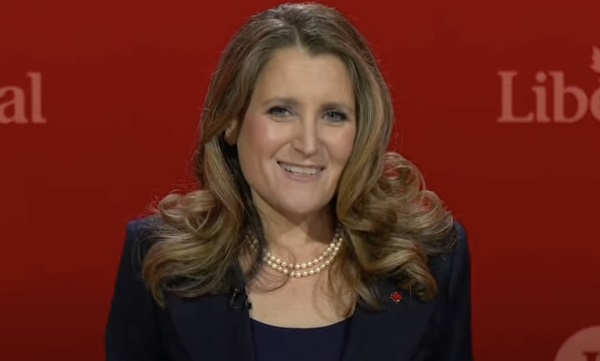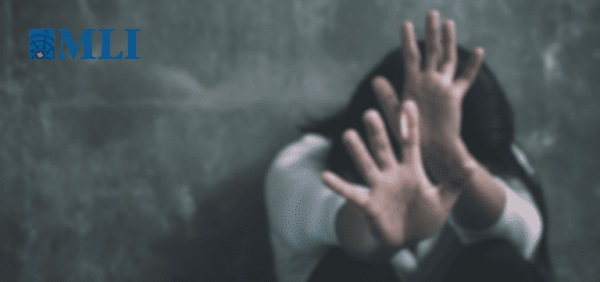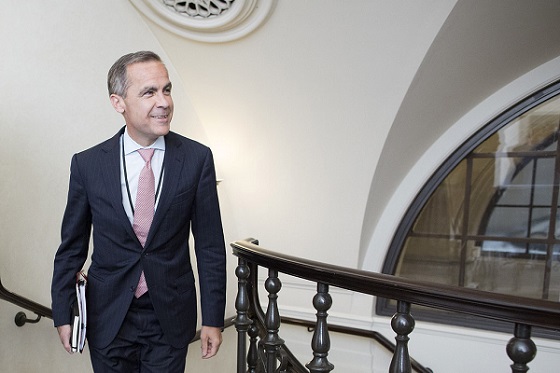Alberta
In Alberta you can give a private MRI scan to someone for Christmas

Alberta
Can Trump Revive The Keystone Pipeline?


From the Daily Caller News Foundation
By David Blackmon
In a post on his Truth Social media platform Monday night, President Donald Trump said he still wants to see the Keystone XL pipeline through to completion. Here is the full text of the president’s post:
“Our Country’s doing really well, and today, I was just thinking, that the company building the Keystone XL Pipeline that was viciously jettisoned by the incompetent Biden administration should come back to America, and get it built — NOW! I know they were treated very badly by Sleepy Joe Biden, but the Trump Administration is very different — Easy approvals, almost immediate start! If not them, perhaps another Pipeline Company. We want the Keystone XL Pipeline built!”
For those unaware, the company that spent a decade attempting to finance, obtain permits, and build the Keystone XL pipeline project is TC Energy (formerly Trans Canada), which is headquartered in Calgary, Alberta, Canada.
Dear Readers:
As a nonprofit, we are dependent on the generosity of our readers.
Please consider making a small donation of any amount here. Thank you!
Fraught with controversy from the beginning, Keystone XL became a true political football during the Barack Obama presidency as the anti-oil and gas lobby in the U.S. mounted a disinformation campaign to kill public support for it. The mounting of the costly disinformation campaign made the process of obtaining permits at all levels of government – state, local, and federal – far more difficult and time-consuming, needlessly running up the project’s cost in the process.
After the Obama State Department led by Secretary John Kerry refused to issue the international cross-border permit required to complete the line, Trump quickly acted to ensure its approval early in his first term in office. By the time Joe Biden assumed office in January 2021, TC Energy had invested billions of dollars – creating thousands of high-paying jobs in the process – and well over half the line was already in the ground. Still, despite the huge sunk cost and lacking an ability to cite any instance in which TC Energy stood in violation of any U.S. law or regulation, Biden took the extraordinary, indefensible step of cancelling the project with the stroke of a pen.
But can the project really be revived now? It’s an important question given that Keystone XL was designed to bring as many as 830,000 barrels of Canadian oil per day into the United States for refining and delivery to markets.
Here, it is key to note that – as I pointed out last November when then-President-elect Trump raised this topic – TC Energy is no longer the owner of the moribund project. The remnants of Keystone XL were included in a group of assets TC Energy spun off last year when it formed a new company named South Bow Energy.
Complicating matters further is the fact that, after it decided the pipeline was a lost cause back in 2021, TC Energy pulled the installed pipe out of the ground so it could be repurposed for other projects in its portfolio. Then, there’s the fact that many of the permits the company spent years trying to obtain from various levels of governments are no longer valid and would have to go through the application and approval processes again were the project to be revived.
At the federal level, the Department of Interior and FERC would govern most of the necessary permitting processes. President Trump ordered all of his departments and commissions in January to research ways the executive branch can streamline the federal processes and Interior Secretary Doug Burgum included that goal as one of his 6 top priorities in a memo to staff dated February 3.
But even if those projects are successful in speeding up permitting at the federal level, they would have no impact on such challenges at the state and local levels. Activist groups who organized the opposition to the project saw great success in holding up permitting issuances at these lower levels of government, and would no doubt revive that strategy to attack any effort to restart the pipeline.
There can be no doubt that Trump’s desire to get the pipeline built is a laudable goal from a commercial, environmental and national security standpoint. Whether it is a practical goal is another question with many factors arrayed in opposition to it.
But one thing I’ve learned long ago is to never underestimate Donald Trump’s ability to get a deal done, so no one should give up hope just yet.
David Blackmon is an energy writer and consultant based in Texas. He spent 40 years in the oil and gas business, where he specialized in public policy and communications.
Alberta
Alberta Coordinating law enforcement to fight fentanyl

Alberta’s government is working with municipalities to tackle social disorder arising from the fentanyl crisis by aligning community peace officers with local police.
Enhancing law enforcement coordination between the province and municipalities is crucial to strengthening enforcement efforts in the ongoing fight against fentanyl and the illicit drug trade. A more unified response among law enforcement agencies is crucial to effectively and efficiently addressing the fentanyl crisis and its devastating effects on Albertans.
At the request of the provincial government, more than 800 community peace officers from 34 large- and mid-sized municipalities will immediately begin coordinating operations with local police to more effectively combat social disorder stemming from the use of illicit drugs, including deadly fentanyl.
“We know a law enforcement presence will make a difference. Fentanyl continues to endanger the lives of Albertans and is devastating to families and communities. Crisis demands immediate and unified action. By aligning the efforts of community peace officers and local police, we are ensuring a coordinated, team response to combat the illicit drug trade to improve public safety. When community peace officers and local police work together in integrated street patrols, we create a visible and unified front against crime.”
“It takes a team effort to tackle the fentanyl crisis. Every level of government has a role to play. Working together with our municipal partners will ensure we can address this crisis, improve public safety for Albertans and combat fentanyl, which has destroyed families and livelihoods.”
Unifying the operational command of community peace officers under the leadership of municipal police services and the RCMP in the fight against fentanyl will make strides towards safer Alberta communities. Additionally, an increase in law enforcement boots on the ground on Alberta streets will create the operational consistency needed to more effectively combat illicit drugs, crime and social disorder. Closer operational alignment between police and community peace officers is a key part of the Alberta government’s approach to confronting urgent public safety issues with strong, cohesive law enforcement across all Alberta municipalities.
This measure is in response to the province stepping up to work collaboratively across all levels of government to address concerns around fentanyl trafficking and border security. Given the complexity and severity of these issues, municipalities have been asked to implement operational alignment to their community peace officer programs immediately. Alberta’s government appreciates the support of municipalities to tackle these growing concerns together through swift and collaborative action.
“Tackling the fentanyl crisis is critical for supporting healthy communities, and for defending Canada’s economic interests during tariff negotiations. Edmonton has been building a collaborative public safety environment for a long time, and we will continue to look for opportunities to collaborate to keep our city safe.”
“Calgary is fully aligned with the province in tackling the complex and devastating drug crisis, and we have led the way with a strong, unified response for the last several years. We recognize the severity of this issue and the critical need for continued collaboration and coordination between Calgary Police Service and our Community Peace Officers. Our integrated approach has amplified our collective impact on public safety.”
Visible officer presence matters and by having community peace officers and municipal police work together in integrated operations, Alberta’s government is bolstering the law enforcement presence that effectively deters criminals and illegal activity. When community peace officers and municipal police work together in integrated street patrols, it will create a visible and unified front against crime.
“The Alberta Association of Chiefs of Police (AACP) reaffirms its unwavering commitment to collaborating with the Province of Alberta to aggressively address the urgent challenges related to fentanyl use/trafficking, including the increased crime and disorder associated with it. The AACP supports strong collaboration and cooperation between the police of jurisdiction and municipal peace officers in an integrated response to public safety concerns. The AACP remains steadfast in its commitment to working together on pressing public safety issues.”
“Alberta Municipalities is pleased to work with the provincial government on this important initiative. Our member communities welcome the opportunity to contribute to a unified approach to tackling drug trafficking and drug use.”
“Alberta’s mid-sized cities are proud to participate in this joint effort. By enhancing law enforcement coordination, we are confident we will create a more effective system that keeps our communities and citizens safe while making real progress on reducing crime and social disorder. We thank the Government of Alberta for working side-by-side with municipalities and ensuring close collaboration on the issues that matter most to our residents.”
The province will monitor the effectiveness of these changes in improving public safety to ensure the best path forward.
Quick facts:
- In mid-February, the minister of public safety and emergency services sent formal letters to 34 municipalities requesting that they immediately begin working with police leadership to align or unify the operational command of their community peace officer programs under the leadership of their police of jurisdiction.
- Municipalities were requested to implement these changes by Feb. 24, 2025.
- There are currently 806 peace officers employed in large and mid-sized municipalities across Alberta.
-

 National1 day ago
National1 day agoWar against the US? Chrystia Freeland says Canada, allies need to build ‘New World Order’ to combat Trump
-

 Opinion1 day ago
Opinion1 day agoLiberal leadership race guarantees Canadian voters will be guided by a clown show for a while yet
-

 Business1 day ago
Business1 day agoTaxpayers launching court fight against CBC transparency
-

 Business1 day ago
Business1 day agoElon Musk: ‘I’m getting a lot of death threats’ due to DOGE
-

 Crime1 day ago
Crime1 day agoCould the UK’s ‘Grooming Gangs’ operate in Canada?
-

 Alberta1 day ago
Alberta1 day agoAlberta Coordinating law enforcement to fight fentanyl
-

 Alberta1 day ago
Alberta1 day agoCan Trump Revive The Keystone Pipeline?
-

 Energy1 day ago
Energy1 day agoTrump’s tariffs made Ottawa suddenly start talking about new east-to-west pipelines, but how long will it last?



